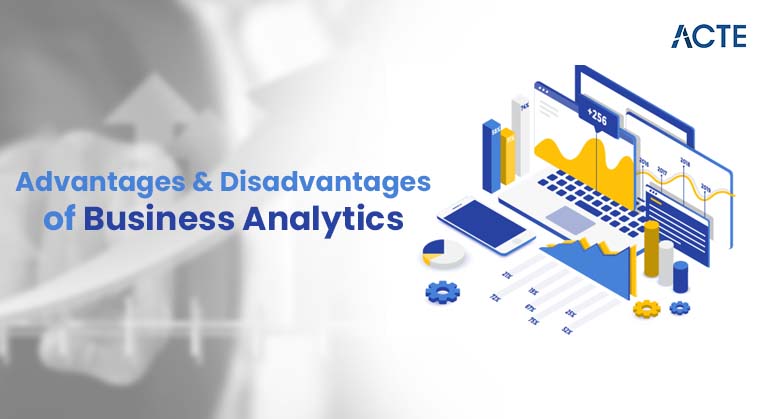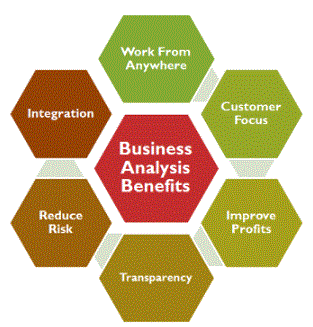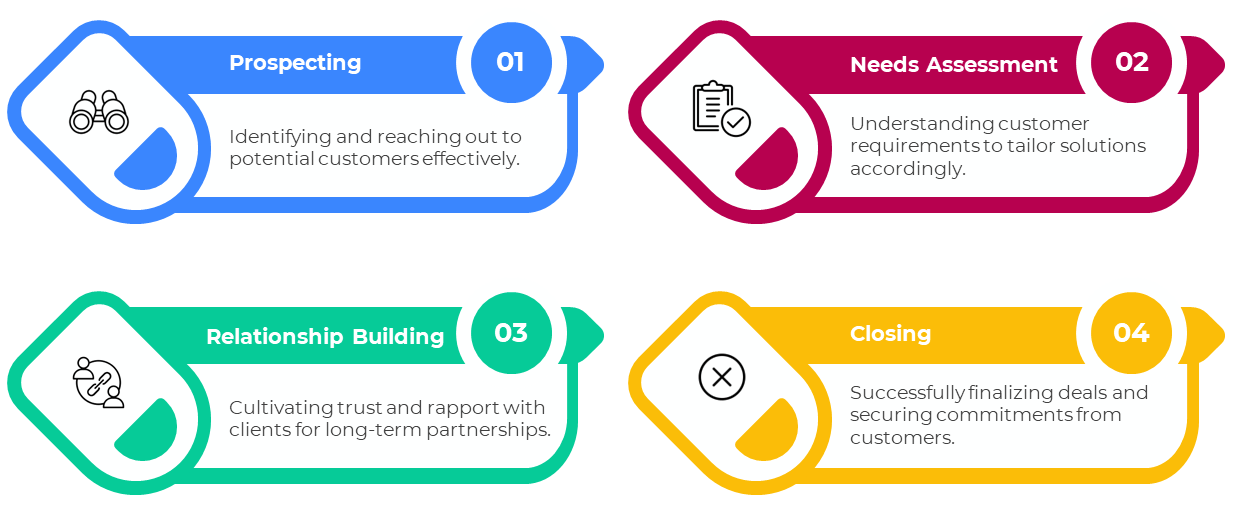
- Introduction
- Key Advantages
- Data-Driven Decisions
- Competitive Advantage
- Enhanced Efficiency
- Predictive Insights
- Challenges in Implementation
- Data Privacy Concerns
Introduction
Business Analytics refers to the use of data analysis tools and techniques to help organizations make informed decisions and improve business performance. It involves the systematic process of gathering, interpreting, and leveraging data to uncover trends, patterns, and insights that guide strategic planning. By utilizing various methods like statistical analysis, predictive modeling, and data mining, businesses can gain a competitive edge, optimize operations, and enhance decision-making processes. In today’s data-driven world, Business Analytics, supported by Business Analyst Training plays a crucial role in identifying opportunities for growth, improving efficiency, and predicting future trends. The Advantages and Disadvantages of Business Analytics include better decision-making, improved operational efficiency, enhanced customer insights, and the ability to adapt to changing market conditions. On the other hand, the Advantages and Disadvantages of Business Analytics also include the potential for data overload, high implementation costs, and the complexity of interpreting vast amounts of data. Additionally, businesses may struggle with data privacy issues and the challenge of ensuring data accuracy. Despite these challenges, Business Analytics remains a powerful tool for driving business success, providing a clear understanding of market dynamics, and offering a foundation for long-term strategies that align with organizational goals.
Are You Interested in Learning More About Web Developer Certification? Sign Up For Our Business Analyst Online Training Today!
Key Advantages
- Improved Decision-Making: Business Analytics allows organizations to make more informed and accurate decisions based on real-time data and predictive models.
- Increased Efficiency: By identifying inefficiencies and optimizing processes, Business Analytics helps businesses streamline operations and reduce costs. Gaining an understanding of the Scope of Business Analytics is essential for recognizing how these improvements can be strategically implemented across various functions.
- Enhanced Customer Insights: Analytics provides a deeper understanding of customer preferences and behaviors, enabling personalized marketing and better customer retention strategies.
Business Analytics offers numerous advantages to organizations seeking to improve their decision-making processes and overall performance. By utilizing data-driven insights, businesses can unlock greater efficiencies, enhance customer experiences, and gain a competitive edge. However, while the benefits are significant, there are also challenges in the implementation process, including data privacy concerns. Below are the key advantages of Business Analytics:

- Competitive Advantage: Companies using Business Analytics can gain a competitive edge by identifying emerging trends, market demands, and growth opportunities faster than their competitors.
- Data-Driven Strategy Development: Business Analytics helps in formulating strategies backed by data, ensuring that business decisions are aligned with actual market trends and not just assumptions.
- Challenges in Implementation: While the benefits are evident, businesses face challenges in implementation, including the integration of advanced analytics tools and the need for skilled personnel.
- Data Privacy Concerns: With the use of large amounts of data, businesses must ensure they comply with privacy laws and maintain ethical practices to protect sensitive customer information.
- Innovation: Continuously introducing new products, services, or processes that meet customer needs better than competitors can provide a significant edge in the market.
- Cost Leadership: By optimizing operations and reducing production costs, companies can offer products at lower prices, attracting price-sensitive customers and gaining market share. Learning how to become a Power BI Developer can empower professionals to visualize and analyze operational data effectively, driving smarter cost-saving strategies.
- Customer Experience: Providing exceptional customer service and personalized experiences can help businesses retain loyal customers and foster brand advocacy, setting them apart from competitors.
- Brand Strength: A strong brand that resonates with consumers builds trust and recognition, making it more likely for customers to choose that brand over others.
- Technology and Data: Utilizing advanced technologies and data-driven decisions enables companies to better understand market trends, forecast demands, and improve operational efficiency.
- Talent and Workforce: A skilled and motivated workforce drives innovation, improves productivity, and enhances overall performance. contributing to a business’s long-term competitive advantage.
- Informed Decision-Making: Predictive insights help businesses make data-driven decisions by forecasting trends and potential risks, allowing them to plan proactively.
- Improved Customer Targeting: By predicting customer behavior, businesses can tailor marketing strategies to better engage customers, resulting in higher conversion rates and customer retention. Leveraging insights from Top Business Intelligence Tools enhances this process by providing accurate data analysis and actionable trends.
- Operational Efficiency: Predictive analytics helps businesses identify areas of inefficiency and streamline operations, reducing costs and improving overall productivity.
- Better Resource Allocation: With a clear view of future demand, companies can allocate resources more effectively, ensuring they meet customer needs without overburdening their operations.
- Disadvantages of Business Analytics: Despite its advantages, predictive insights are only as accurate as the data used to generate them, and inaccurate data can lead to poor predictions.
- Challenges in Implementation & Data Privacy Concerns: Implementing predictive analytics requires overcoming significant challenges in implementation, such as integrating advanced tools and ensuring data quality. Additionally, the use of sensitive customer data raises data privacy concerns, requiring businesses to comply with regulations and maintain ethical data handling practices.
Data-Driven Decisions
Data-driven decisions refer to the practice of using data as the primary basis for making business choices rather than relying on intuition or subjective judgment. By leveraging data analytics, companies can enhance decision-making accuracy, uncover hidden trends, and base strategies on concrete evidence. This approach allows businesses to optimize operations, improve efficiency, and respond more quickly to market changes. One of the key factors that ensures the effectiveness of data-driven decisions is data quality. Understanding what is ordinal data is also crucial, as it helps analysts interpret and prioritize information based on ranked values, leading to more accurate and meaningful insights.High-quality data ensures that businesses make accurate, actionable decisions rather than relying on faulty or incomplete information. Data-driven decisions provide a significant competitive advantage, enabling companies to identify market trends, predict customer behaviors, and allocate resources more efficiently. This results in a more robust competitive strategy that positions businesses to outperform their competitors. However, as companies rely more on data for decision-making, data privacy concerns become more critical. Organizations must ensure that they handle customer information ethically and in compliance with legal regulations to maintain trust and avoid potential penalties. Despite these challenges, the ability to make data-driven decisions continues to be an essential aspect of modern business strategy, offering companies the insights they need to stay competitive and sustainable in a rapidly evolving market.
Are You Preparing for Business Analyst Jobs? Check Out ACTE’s Business Analyst Interview Questions & Answers to Boost Your Preparation!
Competitive Advantage
Competitive Advantage refers to the unique attributes or capabilities that allow a business to outperform its competitors in the market. It can stem from various factors, including cost leadership, innovation, customer service, or technological expertise. Achieving and sustaining a competitive advantage is crucial for long-term success, as it helps companies differentiate themselves and attract more customers. Here are six key points on how businesses can gain a competitive advantage:
Are You Considering Pursuing a Master’s Degree in Business Analyst? Enroll For Business Analyst Masters Program Training course Today!
Enhanced Efficiency
Enhanced efficiency refers to the ability of a business to optimize its processes, reduce waste, and achieve more with fewer resources. One of the key drivers of enhanced efficiency in today’s competitive market is Business Analytics, which enables organizations to make data-driven decisions, streamline operations, and identify areas for improvement. By analyzing data, businesses can pinpoint inefficiencies, eliminate bottlenecks, and improve workflow, leading to faster decision-making and resource allocation. The advantages of Business Analytics in driving enhanced efficiency include better operational performance, cost reduction, and more accurate forecasting. Business Analyst Training helps professionals develop the skills needed to leverage these benefits effectively. However, there are also disadvantages of Business Analytics, such as the high initial investment in tools and technology, as well as the need for skilled personnel to interpret the data. Additionally, challenges in implementation can arise, including integrating analytics into existing systems, data silos, and organizational resistance to change. Companies may also face obstacles in ensuring the accuracy and consistency of data, which are crucial for effective analysis. Furthermore, as businesses increasingly rely on data, data privacy concerns become a significant challenge. Companies must navigate the legal and ethical implications of handling sensitive customer information to ensure compliance and maintain trust. Despite these challenges, the potential for enhanced efficiency through Business Analytics remains a powerful tool for businesses to stay competitive.

Predictive Insights
Predictive insights refer to the ability to use historical data and advanced analytics techniques to forecast future trends and outcomes. By harnessing predictive models, businesses can make informed decisions that anticipate customer behavior, market shifts, and operational demands. These insights not only improve strategic planning but also give organizations a competitive edge in a fast-paced market. However, while the benefits are clear, businesses must also be aware of the advantages of Business Analytics, as well as the challenges associated with its use. Here are six key points regarding predictive insights:
Challenges in Implementation
Challenges in Implementation of business analytics can significantly impact an organization’s ability to leverage data effectively for decision-making and operational improvements. One of the primary hurdles is the integration of advanced analytics tools into existing systems, which can be complex and time-consuming. Organizations often face difficulties in ensuring that their data infrastructure supports the scale and demands of business analytics, especially if they have legacy systems in place. Additionally, data quality is crucial, as inaccurate or incomplete data can lead to misleading insights and poor decisions. Another challenge is the lack of skilled personnel, as businesses need data scientists, analysts, and other experts to interpret complex data and create actionable strategies. Moreover, there is the issue of organizational resistance to adopting new technologies and changing traditional processes. Employees may be reluctant to embrace data-driven approaches due to a lack of understanding or fear of disruption. Highlighting Tableau Career Opportunities can help motivate teams by showing the value and career growth potential in adopting modern analytics tools. Furthermore, as companies increasingly rely on data, data privacy concerns become critical. Ensuring compliance with data protection regulations and safeguarding sensitive information can be both a legal and ethical challenge. Despite these obstacles, overcoming the challenges in implementation is essential for businesses to harness the full potential of business analytics and stay competitive in the data-driven marketplace.
Are You Interested in Learning More About Business Analyst? Sign Up For Our Business Analyst Online Training Today!
Data Privacy Concerns
Data Privacy Concerns have become a critical issue as businesses increasingly rely on data to drive their operations and strategies. With the vast amounts of personal and sensitive information being collected, organizations must ensure they protect this data from breaches and misuse. The quality of data plays a crucial role in this process, as accurate, reliable data is essential for making data-driven decisions and crafting effective competitive strategies. However, managing and securing large datasets often poses significant challenges, particularly with varying global regulations such as GDPR and CCPA. A company’s ability to maintain high data quality is intertwined with its ability to protect privacy, as poor data handling or inadequate security measures can result in significant breaches. Business Analyst Training equips professionals with the skills to manage data responsibly and implement robust security practices. Data privacy concerns can also affect a company’s competitive advantage. Consumers are more likely to trust businesses that prioritize data security, which in turn strengthens customer loyalty and brand reputation. Conversely, a breach can lead to reputational damage and legal consequences. For companies focused on leveraging data for data-driven decisions, safeguarding privacy is non-negotiable, as a failure to do so can undermine the very insights they rely on to maintain a competitive edge. As the digital landscape evolves, addressing data privacy concerns is vital to ensuring sustainable, ethical, and secure business practices.




